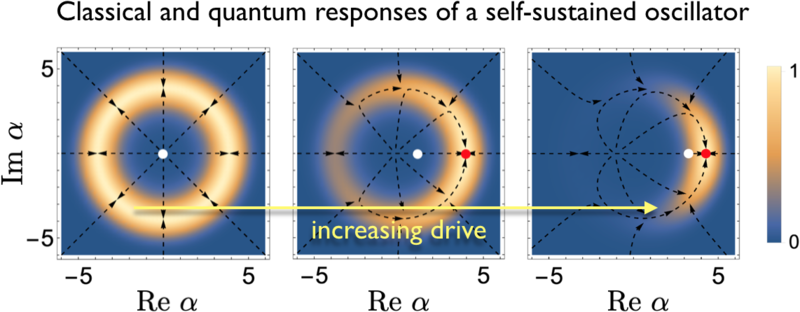Research Highlights
A quantum ear
The authors show how a quantum limit-cycle oscillator can sense extremely weak signals, beyond what is possible classically or in a passive system.

Classical trajectories (dashed arrows) and steady-state quantum probability density in phase space as a function of external drive. Measurable quantum and classical responses are shown by white and red dots, respectively. As the quantum system crosses over from a symmetry-broken limit-cycle phase to the classical steady state, its susceptibility is only bounded by two-body loss. In contrast, the classical response hardly changes.
Self-sustained oscillations are ubiquitous in nature, from heartbeats to electrical circuits. Physical systems on the verge of such oscillations are incredibly sensitive to external drives and play a key role in biological sensors, e.g., enabling the detection of very weak sound in vertebrate ears. In a study published in Physical Review Letters, the authors showed this heightened sensitivity persists into the quantum world of atoms and photons. Their findings could trigger important advances in quantum sensing and shed new insights into the out-of-equilibrium dynamics of quantum systems.
Dutta and Cooper modeled a prototypical scenario where a quantum oscillator is subject to energy dissipation. Ordinarily, the response of such oscillators is limited by damping. However, the authors showed this limit can be overcome via a strong pumping mechanism, leading to an enhanced sensitivity bounded only by weak nonlinear effects. Additionally, the study revealed novel features that are unique to the quantum realm, including a surprising regime where the response diminishes with increasing drive. These predictions apply to a wide array of quantum systems and can be probed in present-day experimental laboratories.